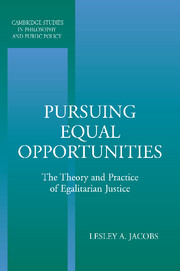Book contents
4 - Equal Opportunities and Civil Rights: Merit, Standardized Tests, and Higher Education
Published online by Cambridge University Press: 05 June 2012
Summary
INTRODUCTION
The goal of this chapter is to explain how a familiar account of civil rights flows from the three-dimensional model of equal opportunities as a regulative ideal that I have been defending in the last two chapters. The idea that civil rights are grounded in the ideal of equality of opportunity was once widely held but now seems to be in disrepute. This has engendered an intellectual crisis in the sense that civil rights seem to rest on weak foundations, and their defenders have embarked on a search for an alternative or supplementary account of egalitarian justice to ground civil rights. It is my belief that this new search is misdirected and that at least one attractive model of equality of opportunity – the three-dimensional model of equal opportunities as a regulative ideal – can well explain the normative role of civil rights. The main insight I defend is that civil rights are legal devices for promoting status equality as a principle of background fairness.
Although the emphasis is on the idea of civil rights, that idea is notoriously elusive and imprecise. As Lloyd Weinreb has pointed out, “For all the discussion and debate about civil rights, it is striking how little attention is given initially to the question of what civil rights are. There is no well-understood principle of inclusion or exclusion that defines the category.
- Type
- Chapter
- Information
- Pursuing Equal OpportunitiesThe Theory and Practice of Egalitarian Justice, pp. 83 - 115Publisher: Cambridge University PressPrint publication year: 2003

